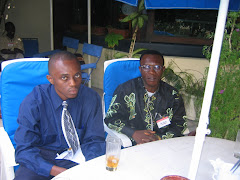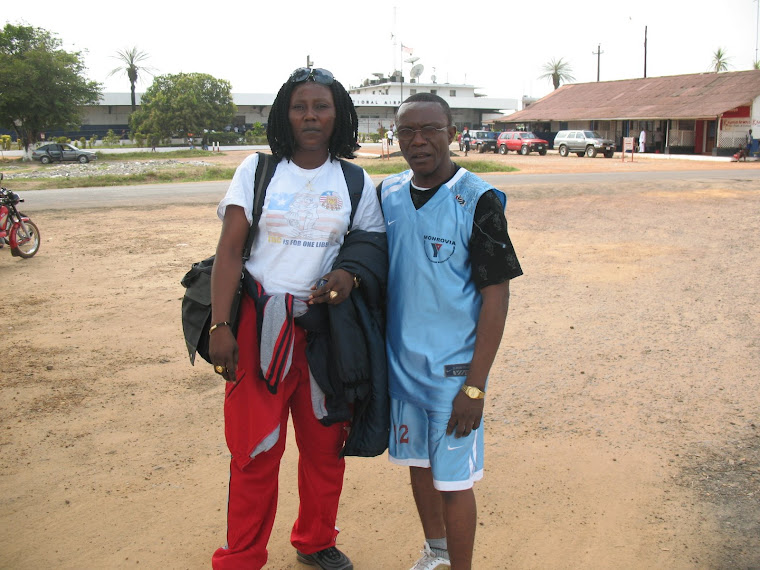...To Liberia's Recovery Process
UN Secretary General Ban Ki Moon arrives in Monrovia late Monday evening.
Monrovia -
“I was very much impressed and overwhelmed by such very warm welcome at the airport upon my arrival,” the United Nations Secretary General Ban Ki-moon told United Nations Mission in Liberia (UNMIL) Radio in an exclusive following his arrival to Liberia late Monday evening.
He said he was visiting Liberia to express his strong support and the commitment of the United Nations to help the Liberian Government and people overcome its socio-economic and political challenges. “At the same time, I hope the Liberian leadership and people will continue to exert their efforts to make their country more democratic based on norms and procedures as well as make the country more prosperous.”
He said he was very pleased to visit Liberia for the first time in his capacity as UN Secretary General to see first hand the progress that Liberia has made and is making with the cooperation of the United Nations. “As this is a country that has experienced a long conflict and now is in the process of peace-building, I just wanted to bring a strong message to the Government and people of the United Nations commitment to support their noble efforts to bring peace, stability and development,” the UN Secretary General emphasized; noting emphatically his admiration for Africa and Liberia’s first female President, Mrs. Ellen Johnson Sirleaf for her leadership in bringing peace and stability to this country.
On whether the UN still considers Liberia as a country in crisis, Mr. Ban replied in the negative saying that this country is in a peace consolidation phase which is gradually drawing to a close and would soon lead to normalcy.
He said Liberia, during the last four and half years, has made tremendous progress in the area of peace building. Mr. Ban said that he was very proud over the achievements that Liberia has undergone since the end of the civil war in the area of peace-building, strengthening their relationship with their neighbors including ECOWAS, as well as enhancing good governance.
As regards the planned drawdown and what the Mission would look like, Mr. Ban said he has made recommendations to the UN Security Council for the first phase of the drawdown plan which has set September 2008 for the phased drawdown of military and police; this has been approved. He noted that based on core benchmarks, the Security Council will then consider the second phase of the drawdown. “I have also discussed with President Johnson Sirleaf about the eventual three phase drawdown plan which lapse in 2010,” he stated; adding, “This drawdown will be done in a gradual step-by-step manner so that it wouldn’t create any negative impact to this peace consolidation process.”
Mr. Ban noted furthered that even during the drawdown phases, UN specialized agencies, funds and programmes will continue to operate geared towards the country’s development efforts.
The UN Secretary General said even though the country is lagging behind in the area of the Millennium Development Goals (MDGs), he was quite confident that over the next five years, through the peace consolidation process, Liberia will be known for enhancing its democratic process, economic development, and transparency.
When questioned about calls from Liberians on the UN travel ban and assets freeze lists to have their names removed or be heard since the reasons for them being placed on these lists no longer exists with former Liberian President Charles Taylor now facing trial at The Hague, the UN Secretary General made it emphatically clear that decisions to remove names from the travel ban list rests solely with the UN Security Council Committee concerning Liberia.
“I’m aware that the Committee is engaged in reviewing the list in light of the developments in Liberia. A mechanism exists by which individuals on the list can appeal to the Security Council Sanctions Committee,” he said; adding, “I understand two persons have already been removed from the travel ban list through this mechanism.”
On the larger sub-Saharan Africa scene with regards recent problems over the rise in the international prices of food and oil and how is it affecting the work of the UN World Food Programme (WFP) and how does it plan to deal with the issue as most relief food is purchased from the same major suppliers who are deciding to reduce their exports?
Mr. Ban emphasized that this is a very serious issue which he has already taken up in close coordination with the international community, noting that it does have a very negative impact especially WFP and the UN refugee agency (UNHCR).
He said these two UN agencies are experiencing shortage of their resources. “WFP has made an urgent appeal to donors to fill this missing gap. However, in a longer term, this will also negatively affect our efforts to realize the MDGs. I’m afraid that it will affect the poorest of the poor in the world mostly in African countries,” Mr. Ban disclosed.
He has decided to urgently create a task force where eminent experts and policy authorities including international financial institutions like the World Bank and International Monetary Fund will participate. “On the basis of their recommendations, I’m going to take actions to address this very serious issue so that the international community will be able to help those people overcome these acute shortages,” Mr. Ban said; noting that unfortunately, they have seen many protests and riots in many parts of the world including Haiti, Egypt, Burkina Faso. As such the international community needs to importantly address this issue with the greatest sense of urgency.
On the question of whether an African solution through the African Union (AU) for resolving African conflicts a real option and whether it is in fact working? Mr. Ban said the UN continues to maintain a very strong and close partnership with the AU in addressing many serious political and regional conflicts, development, human rights issues. “This is a very important pillar of our work in addressing many important African challenges.”
He citied an example where there was a very important debate at the Security Council that saw the involvement of many African and European Heads of States and Government discussed how to strengthen partnership between the UN and AU and how to strengthen the UN overall capacity and cooperative relationship with regional organizations. He said it was an encouraging one and is committed to work closely with AU in addressing African challenges.
He noted that main challenges facing the UN at this time as the pillar that comprises Peace & Security and Development and Human Rights.
Meanwhile, Mr. Ban shortly addresses the joint session of the 52nd National Legislature at the Capitol Building.
Following his address to the joint session of the 52nd National Legislature, Mr. Ban will visit the Foreign Ministry for an official photograph and will sign the Guest Book.
He will also meet with members of the Cabinet and raps up his visit with a press conference on the ground floor at the Ministry of Foreign Affairs.
Following lunch hosted by the Vice President Boakai at the Ministry of Foreign Affairs, Mr. Ban and delegation departs to the James Spriggs Payne Airport where he will take a helicopter ride to the Roberts International Airport where he will continue his trip to Burkina Faso, the third stop on his West African tour
Wednesday, April 23, 2008
Subscribe to:
Post Comments (Atom)




No comments:
Post a Comment